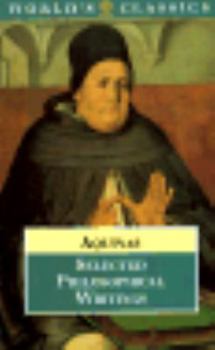Selected Philosophical Writings
Select Format
Select Condition 
Book Overview
St. Thomas Aquinas (1225-1274) saw religion as part of the natural human propensity to worship. His ability to recognize the naturalness of this phenomenon and simultaneously to go beyond it--to explore, for example, spiritual revelation--makes his work as fresh and readable today as it was seven centuries ago.
This accessible new translation offers thirty-eight substantial passages not only from the indispensable Summa Theologicae, but from many...
Format:Paperback
Language:English
ISBN:0192829467
ISBN13:9780192829467
Release Date:December 1993
Publisher:Oxford University Press, USA
Length:496 Pages
Weight:0.55 lbs.
Dimensions:0.8" x 4.6" x 7.4"
Customer Reviews
4 ratings
Reasonable introduction to the angelic doctor
Published by Thriftbooks.com User , 17 years ago
St Thomas Aquinas's entire corpus is immense and fills several shelves on a bookcase. The Summa Theologica alone is usually contained in three to five massive pages. Aquinas is the most brilliant of the medieval philosophers who tried to reconcile 'faith' and 'reason' in the Christian tradition. Even today, he is extremely important in Catholic scholasticism (in its revived forms) and in many areas of Christian theology. Much of Catholic Church dogma still relies on Aquinas (he is probably the most quoted philosopher in the Catcheism, along with Augustine). He is also well worth studying in his own right. His discussions of God, the universe, the ethical good and virtues are still of interest today. His thought also influenced other great medieval thinkers, including Eckhart and Nicholas of Cusa. While much of the angelic doctor's speculations about angels and demons and about realities beyond our sense experience may seem to make little sense in our skeptical era, his system contains profound and original thought often argued with considerable creativity and genius. The sheer scope of his interests combined with a passionate and sincere spirituality make him by far one of the most appealing of great Christian thinkers. Unfortunately Aquinas has been associated with decadent scholasticism but Aquinas had a healthy and critical mind (given the historical context), a very acute ability to understand philosophical concepts, and he was an original thinker able to bring insights and arguments of his own to a problem. While I believe in some respects Aquinas's conception of God as Being is flawed, modern theology can still gain much from carefully studying Aquinas.
St. Thomas for Beginners
Published by Thriftbooks.com User , 19 years ago
The best way to know the thought of a great thinker is to read what he wrote rather than what others wrote about what they think he wrote. For St. Thomas, to learn about the world is to take a peek into the mind of God. The collection of texts in this book give a great sense of what he thought about our world, its structure and our place in it. Just enough to whet your appetite for more.
great Aquinas starting point
Published by Thriftbooks.com User , 21 years ago
This book packs a lot of material. As an anthology, as the other reviewer has ably mentioned, this is wonderful. This book would be extremely useful to the student of Christian theology (Roman Catholic or Protestant) or to the student of historical philosophy. If you are studying the works of Aquinas for history, a few words of caution. A lot of his philosophy is based on Aristotle. If you do not understand basic Aristotle, this can be painful at times. "Actualize" and "potential" and sufficient causes, etc. will appear a lot. If you are unfamiliar with what this terminology means, you will have slow going. This is just a problem with some philosophy. Kant, another member of the big-5 team of greatest philosophers, also suffers from a language barrier to modern readers. But like Kant, you can still get a lot out of it.The editor of this book has put in a lot of useful and wonderful theology of Aquinas. This is good b/c not many people believe in his metaphysics anymore. So his theology may have more modern usefullness. Given his influence over Western Christianity and Roman Catholicism in particular, Aquinas is definitely worth the read. One of the small gems (and unexpected) was a part of Aquinas' commentary on I Cor. 15. Sections on the Problem of Evil are in here as well. I was surprised, but glad, to see that the editor left in a section on the problem of using language to describe God. This was a typical 20th century problem. It's good to see that there aren't many new philosophical problems.If you are just getting into Aquinas (and you have some background in philosophy) this is a good place to start. If you are interested in theology, there is much in here for you as well. Given the structure of the book, you do not have to read straight through.
A model anthology
Published by Thriftbooks.com User , 22 years ago
McDermott has provided the general reader with an excellent introduction to the substance of Aquinas's thought. Selections are taken from several works, not just the Summa Theologiae, and are arranged in an orderly manner that contributes much to the usefulness of this book. The first section discusses the division of the sciences; the second, ontology; the third, titled "The Ladder of Being," covers such topics as life and the soul, the senses, the mind, and the will. Following this come three large sections on God, filling more than half of the book. Each of the many passages begins with brief headnotes giving the origin of the passage, the philosophical genre to which it belongs, and translation notes on principal Latin terms. McDermott includes very little commentary of his own--Aquinas speaks for himself. The text is laid out very clearly with the judicious use of italics, brackets, and boldface type, all serving to clarify how Aquinas structured his arguments. Recommended to anyone interested in Aquinas, but do not expect a condensed version of the Summa.




